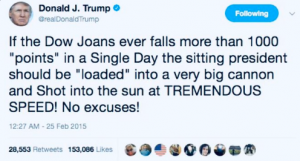Jeg har tidligere anbefalt Flemings Lean Logic — a dictionary of the future and how to survive it.
Fra The Great Transformation:
Transformation, The Great. The Great Transformation has already happened. It was the revolution in politics, economics and society that came with the *market economy, and which hit its stride in Britain in the late 18th century. Most of human history had been bred, fed and watered by another sort of economy, but the market has replaced, as far as possible, the *social capital of *reciprocal obligation, *loyalties, authority structures, *culture and *traditions with exchange, price and the impersonal principles of *economics.
Unfortunately, the critics of economics have had a tendency to discuss the whole structure as a tissue of misconceptions. It is a critique that fails. The strength of economics is its considerable, if far from complete, understanding of the flows and comparative advantages that underlie trade, jobs, *capital and incomes, and the logic of optimising behaviour, all backed by glittering accomplishment in mathematics. That makes it a powerful analytical instrument, so that just a few misconceptions – such as a failure to understand the *informal economy or resource depletion – can have leverage: like a baby monkey at the controls of a Ferrari, they can turn it into an instrument with extraordinarily destructive potential. If it were a tissue of errors, it would not be dangerous: it is its 90% brilliance which makes it so.
Economics has therefore been seductive. The market economy is effective for sustaining social order: the distribution of goods, services and other assets is facilitated by buying and selling, supporting a network of exchange to which everyone has access. It provides suppliers with the incentive to know their markets and respond to them; it uses *’pull’ rather than top-down regulation, and it learns from experience, so it is effective and efficient. It supports a more egalitarian society than any other large-scale state has been capable of and it saves a great deal of trouble: it has appealed to minds glad of a cognitive technology which enabled them to make decisions according to mathematical models, and with little fear of contradiction.
‘Douce commerce,’ sweet commerce, wrote Jacques Savary, an early management consultant, in a textbook for businessmen (1685), ‘makes for all the gentleness of life.’ The authorities themselves agreed: commerce is the most ‘innocent and legitimate way of acquiring wealth’, observed an edict of the French government in 1669; it is ‘the fertile source which brings abundance to the state and spreads it among its subjects.’
Indeed, the government’s main task in a mature market economy is to keep it free of obstacles that might stop it growing – like a bemused farmer would treat the enchanted goose: keep the foxes out so that it can go on magically laying its golden eggs.
Its achievements and answers sound authoritative and final, but what is truly most significant about them is how naïve they are – if the flow of income fails, the powerfully-bonding combination of *money and self-interest will no longer be available on its present all-embracing *scale, and perhaps not at all. And it must inevitably fail, as the market’s taut *competitiveness demands ever increasing *productivity and thus relies on the impossibility of perpetual *growth.
In the meantime, the reduction of a society and culture to dependence on mathematical *abstraction has infantilised a grown-up civilisation and is well on the way to destroying it. Civilisations self-destruct anyway, but it is reasonable to ask whether they have done so before with such enthusiasm, in obedience to such an acutely absurd superstition, while claiming with such insistence that they were beyond being seduced by the irrational promises of *religion. Every civilisation has had its irrational but reassuring myth. Previous civilisations have used their culture to sing about it and tell stories about it. Ours has used its mathematics to prove it.
Yet, when this relatively short-lived market-society is gone, we will miss its essential simplicity, its price mechanism, its self-stabilising properties, its impersonal exchange, the comforts it delivers to many, and the *freedoms it underwrites. Its failure will be destructive.
And the end is in sight; during the early decades of the century, the market will lose its magic. It is the aim of Lean Logic to suggest some principles for the design of a replacement.






